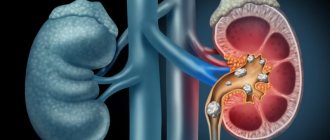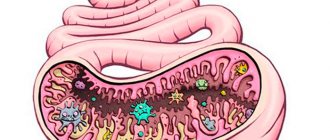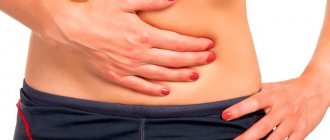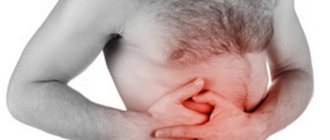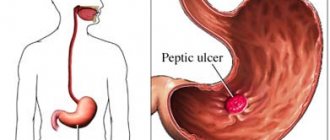Mechanisms of development of vomiting
The act of vomiting is usually divided into several stages - nausea, the urge to vomit and vomiting itself.
Nausea does not always precede the urge to vomit and is expressed in an unpleasant feeling localized in the throat and stomach. At the same time, the natural tension of the stomach muscles drops, and the small intestine begins to work more actively.
The urge to vomit is accompanied by a strong and frequent contraction of the muscles of the peritoneum and diaphragm. During the process of vomiting, the valve of the esophagus opens, and the food in the stomach rises up and then comes out.
At this time, the respiratory organs are blocked, which prevents the contents of the stomach from entering the bronchi and lungs.
As for the mechanisms of vomiting, there are two of them:
- From an organ or organ system, nerve impulses are transmitted to the vomiting center. Signals can be sent by the coronary arteries, gastrointestinal tract, vestibular apparatus, pharynx, etc.;
- Signal transmission can enter the vomiting center from the chemoreceptor trigger area, which is irritated for one reason or another. This may be due to the following factors: oxygen deprivation, taking medications, radiation therapy, infection of the body with pathogenic bacteria, etc.
Food aversion accompanied by nausea and refusal to eat
Unpleasant symptoms such as reluctance to eat and nausea are most often accompanied by weakness. If you find them in yourself, you should immediately consult a doctor. To identify the causes of illness, the patient is prescribed diagnostic procedures. To stop the patient’s lack of desire to eat, he is prescribed a special diet that contains foods that minimize the risk of nausea or reduce it. If a feeling of disgust for food and nausea turn into vomiting, this condition can have various sources. Nausea occurs with stuffiness, hunger, lack of sleep and excess nervous tension. Vomiting is preceded by a loss of strength and paleness of the skin, and discomfort in the throat. Refusal of adequate nutrition is also observed in the early stages of pregnancy, accompanied by toxicosis. In this case, the gag reflex is provoked by specific smells or dishes. In this way, the body tries to protect itself from unwanted substances.
Nausea is not typical for healthy people, so it rarely affects those who eat right, exercise, and follow their daily routine, devoting enough time to sleep and rest. Dizziness with nausea is a sign of the disease. To maintain the vital tone of the body in this case, you cannot refuse food, but the food must be dietary (boiled beef, fruits and vegetables, a minimum amount of salt in food).
Causes of vomiting after eating
Nausea and vomiting after eating are most often caused by pathologies of the gastrointestinal tract, although other etiological factors are also possible.
The causes of vomiting after eating can be the following:
- The presence of ulcers of the stomach, esophagus, intestines;
- Oncological diseases of the digestive system;
- Inflammation of the gallbladder and its ducts;
- Inflammation of the pancreas;
- Any mild brain injury (in other cases the person loses consciousness);
- Pathologies of the central nervous system (brain neoplasms);
- Food poisoning;
- Alcohol poisoning;
- Binge eating;
- The presence of too fatty foods in the menu in significant quantities;
- Emotional shock;
- Chronic fatigue.
With gastritis and stomach ulcers, vomiting will occur after eating. It is possible that a person has stenosis of the cardiac orifice of the stomach and pylorus. Stenosis of this part of the stomach can be caused by the presence of a tumor or chronic inflammation.
If the cause of vomiting is gallbladder pathology, then it can occur not only after completion of the act of eating, but also during this process. Pancreatitis, in turn, in addition to vomiting, is manifested by pain in the left hypochondrium and flatulence.
Injuries, tumors and infections of the brain can cause vomiting after eating, however, these pathologies are accompanied by a whole set of severe symptoms.
The vomiting center, which is located in the brain, can be irritated against the background of severe emotional stress, after experiencing excitement or with severe fatigue. Vomiting occurs after eating simply due to the fact that some contents appear in the stomach.
Nausea from hunger during pregnancy, causes
Hunger nausea is a fairly common occurrence during pregnancy. An unbalanced diet, overwork, hormonal changes in the body, and non-compliance with the diet provoke “sucking” pain in the stomach and a brutal feeling of hunger, coupled with nausea and slight dizziness.
As a measure to prevent “hungry” pain in the stomach, accompanied by nausea and/or vomiting, experts recommend:
1 to prevent nausea from hunger, you can regularly attend special classes for expectant mothers (gymnastics, water aerobics, fitness, yoga for pregnant women);
2 spend more time in the fresh air (long walks help saturate cells with oxygen and normalize hormonal levels);
3 eat foods rich in vitamins (fresh fruits, vegetables, cereals, nuts, fruit drinks, compotes);
Vomiting an hour after eating
Vomiting that occurs such a short time after eating can signal diseases of the gastrointestinal tract such as pancreatitis, cholecystitis, and cirrhosis of the liver. These pathologies are often accompanied by bloating, belching, and lack of appetite.
Vomiting and high body temperature
Sometimes, due to decreased immunity, a person may vomit after eating. But this requires a combination of several factors. For example, if a patient has an elevated body temperature and also has iron deficiency anemia, this can lead to increased blood pressure and vomiting.
Fever and vomiting after eating can be symptoms of food poisoning. Intestinal infection is characterized by similar manifestations, but it is always accompanied by diarrhea.
What to do if you feel disgusted with food?
If you notice a long-term lack of appetite, to find the cause of this condition, first of all, you need to consult a therapist. If the patient does have a health problem, he will be referred to another specialist who can look into his case in more detail. Causes of aversion to food. A decrease in appetite can be observed after smoking and drinking alcoholic beverages, drinking coffee, stress, pain and an increase in body temperature. At the beginning of the meal, a person should experience a slight feeling of hunger, but one should not overeat. It is better to eat in a quiet environment, in a place where there are no unnecessary external stimuli that distract from a measured meal.
The increased load on the nervous system causes a refusal to eat, since all the body’s energy has already been spent on overcoming stress. He simply does not have the strength to accept and process food. In such situations, you can help the body redistribute energy through short fasting. When deciding to stop eating, you need to undergo an examination and consult a specialist. He will be able to help the patient choose a diet based on the characteristics of a particular case and the needs of the body, in order to optimize the process of the body restoring lost strength and energy.
You should listen to your body's signals, and if it does not require food, it is better not to try to forcefully fill your stomach. Fasting is often prescribed for patients who need to lose weight to improve their well-being, and sometimes to reduce stress, for example, on their back. People who have experienced the positive effects of therapeutic fasting become more picky about food, giving preference only to healthy and high-quality food in the future.
Vomiting immediately after eating
Vomiting that occurs within a few minutes of eating can be caused by overeating. In this case, enzymatic preparations, for example, Mezim, Festal, etc., can help.
Eating very fatty, spicy, fried and smoked foods can cause rapid vomiting. This is explained by the fact that the pancreas, stomach and liver could not cope with digesting such heavy food.
High blood pressure can also cause nausea and vomiting.
Symptomatic therapy
Episodic nausea after errors in diet or overeating does not require drug treatment. To relieve unpleasant symptoms, you can drink ginger or mint tea and slowly eat a slice of lemon. To prevent nausea, you need to normalize your diet: eat 4-5 times a day, avoid eating dry food. If you have a food allergy, it is important to completely exclude certain foods from your diet and limit the consumption of peanuts and strawberries, which can cause severe systemic reactions.
If nausea after eating does not go away on its own within a few days and is not associated with physiological causes, you should contact a medical facility for a comprehensive diagnosis. Before the clinical diagnosis is verified, prokinetics that improve motility and prevent antiperistaltic contractions, antihistamines, and sedatives can be used to reduce unpleasant symptoms. If poisoning is suspected, sorbents are recommended.
Vomiting with belching after eating
Belching often occurs due to excess air entering the stomach. This happens when a person eats food in a hurry, quickly chews and swallows food, or eats while talking. An additional risk factor is the consumption of carbonated drinks.
It is possible that belching and vomiting after eating are associated with the consumption of certain foods to which the body previously did not give such a reaction. For example, as people age, they often lose the ability to digest dairy products. This is especially true for whole milk.
Drinking strong coffee on an empty stomach can cause belching and vomiting. The same applies to drinking alcoholic beverages, mushrooms, and canned food.
Vomiting with heartburn after eating
Heartburn and vomiting after eating are symptoms of gastrointestinal pathology, the most common of which is an esophageal ulcer. Thus, increased heartburn will occur when a person lies or leans forward.
Heartburn is expressed in pressure in the epigastric region, nausea and a bitter taste in the mouth. Risk factors include snacking on the go, overeating, drinking alcohol, and taking medications.
Separately, it is worth noting wearing too tight clothes and obesity.
Vomiting of bile after eating
Vomiting with bile after eating is often explained by the fact that the pyloric valve does not cope with its functions and remains open. The causes of disruption in its work are alcohol intoxication, pyloric stenosis, chronic inflammatory processes in the gastrointestinal tract, central nervous system diseases, stress, circulatory disorders, and intestinal obstruction.
A separate condition that can lead to valve dysfunction is pregnancy. Therefore, during pregnancy, vomiting of bile may occur.
Nausea during pregnancy
The process of bearing a child involves significant hormonal changes in the body. The situation is aggravated by the need to increase the amount of food consumed, so if food is insufficient in calories, a feeling of hunger may occur.
However, excess in food consumption is also destructive: uncontrolled weight gain is equally dangerous for both the mother and the fetus. After the onset of toxicosis, the need for food may transform and become enriched with attacks of nausea. Pregnant women should adhere to a healthy diet - take fruits, vegetables and vitamin complexes. Iron, magnesium, calcium, iron are the main elements, due to the deficiency of which pregnant women feel sick and bloated from hunger, as well as the debilitating appearance of increased salivation.
Vomiting blood after eating
The reasons why blood is present in the vomit may be as follows:
- Damage to the integrity of the mucous membrane of the stomach and esophagus;
- Varicose veins of the esophagus and stomach;
- Advanced peptic ulcer;
- Cirrhosis of the liver;
- Exacerbation of gastritis;
- Internal bleeding.
In childhood, blood may be present in the vomit after nosebleeds because the child has swallowed blood. Late toxicosis and high blood pressure can cause internal bleeding in pregnant women, causing them to vomit blood.
Mucous vomiting after eating
If mucus is present in the vomit, this most often indicates food poisoning or toxic substances, or a bacterial intestinal infection. Mucus in the vomit appears due to excessive activity of the duodenum, which is subject to inflammation. It is possible that in addition to mucus, foam and blood will be present in the vomit.
Other reasons for the appearance of mucus in vomit are various pathologies of the gastrointestinal tract and stress factors. When mucous vomiting only bothers you in the morning, you can suspect chronic bronchitis, in which mucus accumulates in the bronchi during the night's rest, and comes out in the morning along with vomit with a strong cough.
Dizziness and vomiting after eating
Dizziness and vomiting can be caused by causes that are not dangerous to human health, including seasickness and motion sickness.
Other, more dangerous etiological factors for dizziness and vomiting after eating include:
- Meniere's disease with prolonged bouts of dizziness and vomiting, as well as hearing impairment;
- Vestibular neuritis. In addition to vomiting and dizziness, the patient experiences panic, congestion in the ears, loss of coordination and balance;
- Migraine. With this disease, vomiting and dizziness are combined with severe headaches. In addition, a person develops photophobia and suffers from balance;
- Hormonal changes in a woman's body. Vomiting and dizziness can be caused by pregnancy, menopause, or the next menstruation;
- Head injuries;
- Epilepsy.
How to reduce appetite?
Among women who seek to create an aversion to food in the name of another diet is an imbalance of nutrients in the diet, minimizing fats, enzymes, microelements and vitamins in it. To prevent the unpleasant consequences of poor nutrition, before starting a diet you need to consult a nutritionist about its appropriateness. Stimulating a decrease in appetite by forcing yourself to go hungry is unacceptable. The optimal solution in this case would be a moderate diet of healthy, good quality foods, separate meals and physical activity, diverting attention from the desire to have an extra snack. Nature has made sure that balance is maintained in the human body, and the work of internal organs is harmonious. Any coercion can cause disruptions in their functioning.
A healthy and fit body shape can be achieved by eating right and regularly engaging in feasible physical exercise. Attempts to turn aggression on oneself lead to changes in eating behavior. To ensure mental health for children, from early childhood it is necessary to make them understand that they are important to the world, to provide care and love. In this case, they will not feel guilty before other people for any differences from them and will look for ways to success only in a beautiful appearance.
How to make yourself refuse food? First of all, you need to ask yourself whether you need it at all. If you overeat, you should talk to a psychologist about possible unknown reasons for your lack of sense of proportion in food, which causes you to gain extra pounds. For a healthy person, eating brings pleasure and does not affect the state of health for the worse.
Bulimia after eating
In some cases, a person can independently provoke the urge to vomit. Girls often do this in an effort to get rid of extra pounds. To do this, after the next meal, they induce vomiting. As a result, the brain, having received a signal of saturation, does not require more food, and body weight does not gain. But over time, the stomach gets used to this reaction and rejects any food, even in small quantities. This disease is called “bulimia” and poses a threat not only to health, but also to human life.
Diagnostics
To provide proper medical care, it is necessary to make an accurate diagnosis. To determine it you need to report:
- nature of discharge, composition;
- associated symptoms;
- time of vomiting.
The further type of examinations depends on the above factors: blood test, urine test, ultrasound, etc. If there is a suspicion of pathology of the gastrointestinal tract, then fibrogastroduodenoscopy, cholecystography, cholecystoangiography are prescribed. This will help clarify the picture of the disease.
Vomiting after eating in a child
The causes of vomiting after eating in children are similar to the reasons that provoke this symptom in adults. Separately, we can note congenital anomalies of the development of the gastrointestinal tract (pyloric stenosis, pylorospasm, etc.), difficult childbirth followed by hydrocephalus or high ICP, as well as physiological regurgitation, which does not pose a threat to the baby’s health and stops as he grows up.
If a person is bothered by vomiting after eating, then you should not self-medicate, but rather seek qualified medical help. A doctor who deals with the treatment of diseases of the gastrointestinal tract is a gastroenterologist, but it is possible that you will need the help of a neurologist, neurologist, therapist, oncologist or surgeon.
Author of the article:
Alekseeva Maria Yurievna |
Therapist Education: From 2010 to 2020 practicing physician at the therapeutic hospital of the central medical unit No. 21, the city of Elektrostal. Since 2020 he has been working at diagnostic center No. 3. Our authors
